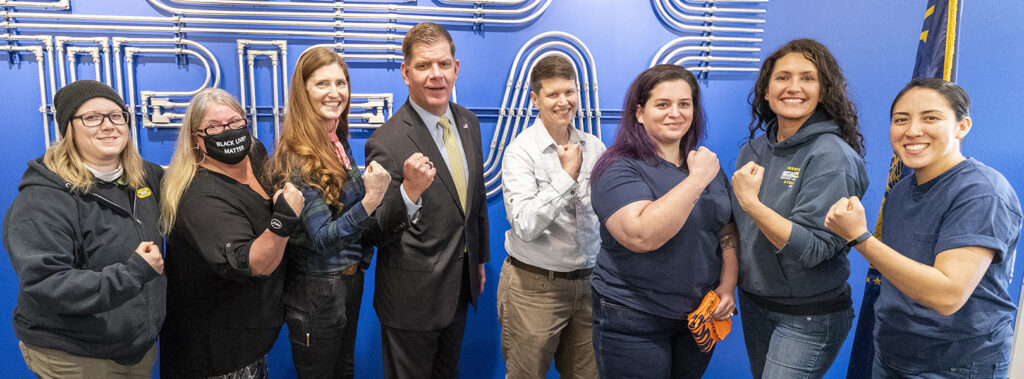This post originally appeared at https://www.badgerinstitute.org/economics-of-the-fist-unions-favor-telling-to-asking-with-wisconsins-right-to-work/
The strong-arm tactics of Act 10 antagonists
Among the winks and nudges offered by Janet Protasiewicz on her way to the Supreme Court was that Act 10, the Gov. Scott Walker labor reforms, are toast.

“I marched at the Capitol in protest of Act 10,” she said.
Would she appropriately sit out a relitigation?
“Maybe.”
Wink, wink.
Democrat-friendly media spelled out that this isn’t just about public-sector unions at issue in Act 10, but a raft of policies that includes “an anti-union right-to-work law,” as a New York Times columnist put it.
Only 7.1% of Wisconsin employees are union members nowadays. But given how progressives, soon in majority on the Supreme Court, apparently see it as a free-range editor of laws they don’t like, Wisconsinites’ legal ability to be uninterested in joining a union is endangered. So what are unions like?
Let’s look to the federal agency they more or less own, the Department of Labor, which has an online primer, “Unions 101.” Across the screen is the welcoming portrait of the labor secretary and a line of people — all brandishing fists. As everyone saw during the 2011 progressive freakout over Act 10, unions love fist imagery. The thug vibe isn’t a stereotype; it’s branding.

Not terribly successful branding: Wisconsin union membership is half what it was in 2010, when 14.2% of the employed workforce paid dues, suggesting that Walker’s labor reforms gave Wisconsinites an escape they desired.
This is something you must hold in mind: The Walker era labor reforms didn’t ban unions, didn’t even make them harder to join. They just made it easier for Wisconsinites to say no.
Act 10 concerned government employees. Under it, the state and local governments were required to bargain about wages — but not workplace rules or benefits, other than with firefighters, cops and other public safety personnel.
This meant that the Wisconsin Education Association Council no longer could strong-arm school districts into buying overpriced health plans from the union’s captive insurer. Districts fled the insurer and taxpayers were no longer fleeced as a means of funneling insurance profits toward union politics.
More crucially, the law stopped governments from skimming union dues out of paychecks: Now, if you want to pay dues to the teachers union, you certainly may, but you have to write a check. Or not, and many prefer that: WEAC had about 98,000 members in 2010; it has 43,000 now that it has to ask politely.
Right to work passed the Legislature in 2015 and endured two years of legal challenges from unions claiming something was taken from them. What was taken were captives: The law, which governs private-sector unions, says that no one can be coerced into union membership as a condition of employment nor fired for not paying the union. It’s up to an employee and no one else.
It is this, your option to join or not as suits you, that unions hate.
Union-friendly Democrats seized majorities in Michigan’s Legislature last fall and already have disposed of that state’s right-to-work law, despite concessions from unions leaders in recent years that they’ve had to work harder at providing satisfactory service to members since membership became voluntary. So much for that: Now it’ll be join or else.
The same threat to your liberty is in play in Wisconsin.
“They can do it,” I was told by Mark Mix, president of National Right to Work Committee. Unions will have to gin up a case and run it up the ladder to a newly friendly Supreme Court, but elections have consequences that translate into opportunities. “Is there a threat? Yeah,” said Mix. “But that threat is predicated on judicial activism.”
It is not predicated on Wisconsinites’ preferences. The Badger Institute has polled repeatedly on whether Wisconsinites think they should be fired for not paying dues, and the answer repeatedly is no. Three-fourths said in 2015 that no one should lose a job for disobeying those brandished fists, including more than half of Democrats. No wonder: Research shows that workers’ income grows faster in states where workers are free.
Unions often claim that workers who don’t pay are “free riders,” benefiting from contracts unions negotiated. But as Mix points out, law doesn’t require that unions add clauses to contracts saying that all employees are covered. They’re free to work a deal for members only, as unions in Europe sometimes do. They won’t. Their bargaining position depends not on cooperation with employers and employees but on being a cartel, a tollgate through which all others must pass.
At bottom, unions — and the progressives looking to make them again mandatory in Wisconsin — don’t get markets. They don’t get that in a market, a seller and a buyer or an employer and an employee must both benefit or no future deals happen. Instead, the game is zero sum, a fight for morsels, and only the bigger fist wins.
Why should Wisconsinites tolerate going back to that?
Patrick McIlheran is the Director of Policy at the Badger Institute. Permission to reprint is granted as long as the author and Badger Institute are properly cited.
The post Economics of the fist: Unions favor telling to asking with Wisconsin’s right to work appeared first on Badger Institute.